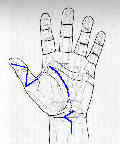- See:
- Excursion, of Tendons
- Thumb Deformities in Rheumatoid Arthritis
- Thumb Soft Tissue Defects
- Flexor Pollicis Longus
- Extensor Pollicis Longus

- Tendon Sheath Anatomy:
- A1 pulley: spans the MP joint, approximately 8 mm in width;
- note that the FPB inserts just proximal to this pulley and the adductor pollicis inserts distal to the A1 pulley;
- oblique pulley: located over the mid aspect of the phalanx, approximately 10 mm in width;
- note that the adductor pollicis partially inserts into the oblique pulley;
- A2 pulley located at the most distal aspect of the proximal phalanx, and is 9 mm in width;
- it may partially span the thumb IP joint;
- Zone 1 Flexor Tendon Injuries:
- in thumb, zone 1 extends from tip of finger to just distal to IP joint;
- contains, oblique and A2 pulleys;
- of these, the oblique is more important, but either can be sacrificed if the other remains intact;
- most tendon injuries of thumb occur at level of IP crease, which is near point of the FPL insertion;
- exposure:
- skin laceration needs to be extended both proximally and distally;
- flexor tendon sheath is "Z" step cut so that edge of the resected sheath lies about 1 cm beyond excursion of thickened area of sutured tendon;
- tendon retrieval:
- first, note that FPL tendon lacerations often retract into the thenar area or wrist;
- unlike the fingers, the FPL often lacks a vinculum and does not have a lumbrical, and therefore the tendon is free to retract;
- when there is tendon retraction, the tendon must be retrieved at the wrist;
- second, note that the FPL tendon sheath is narrow in the thenar region, and therefore, passage of the tendon thru the sheath can be frustrating;
- it is important to avoid "scuffing" of the tendon edge as it is pulled thru the tunnel;
- pass a curved tendon grasper retrograde through the FPL tendon, and insert a core grasping suture into the free edge of the tendon;
- the tendon grasper is then used to pull the suture back thru the tunnel;
- delayed reconstruction: FPL Advancement and Pull Thru
- Zone 2 Flexor Tendon Injuries:
- over thenar eminence, injuries to FPL tendon are likely to occur in conjunction w/ injuries to thenar muscles & recurrent branch of median nerve;
- Tendon Transfers:
- the following musculotendinous units have adequate exursion (muscle amplitude), but lack tension strength based on cross sectional area: EPL, EIP, PL;
- muscles that replace strength and excursion are the following
- FDS to the long and ring fingers, ECU, and ECRL
Restoration of flexor pollicis longus function by flexor digitorum superficialis transfer.

